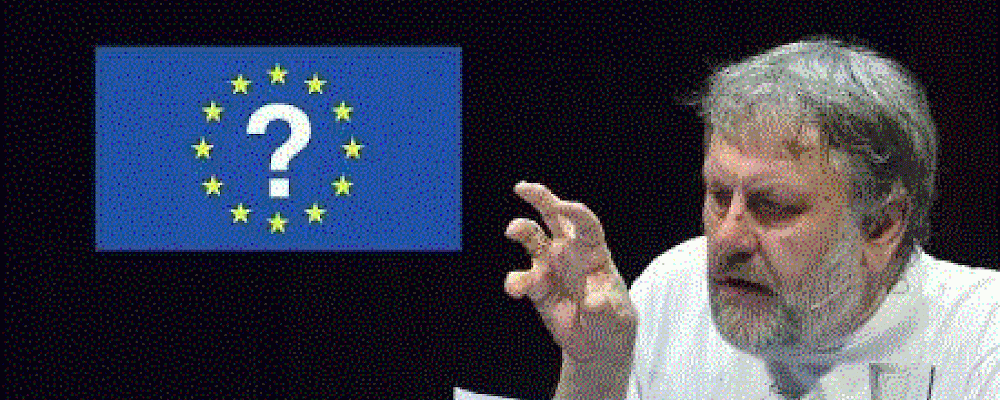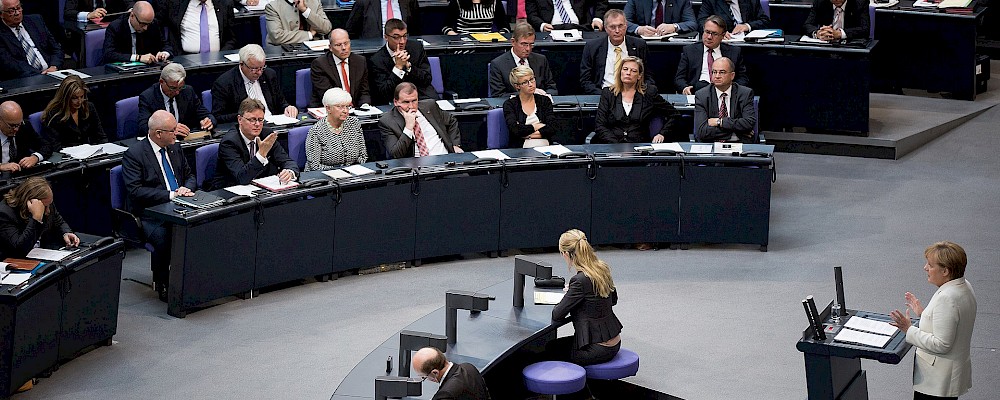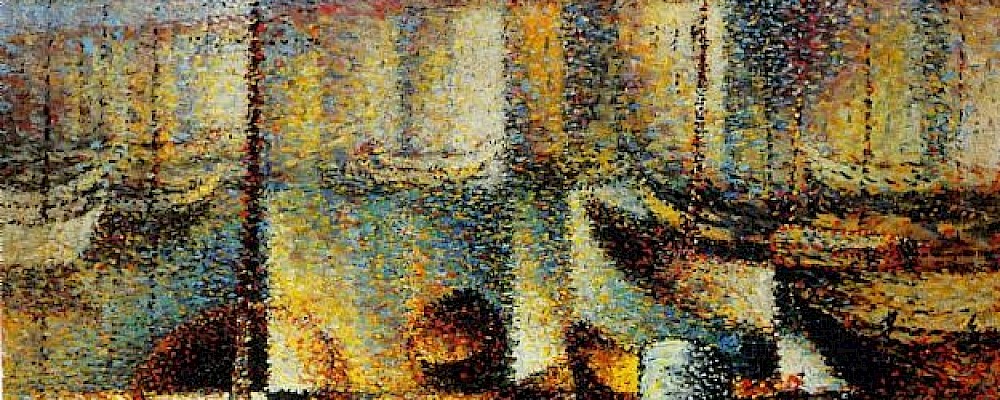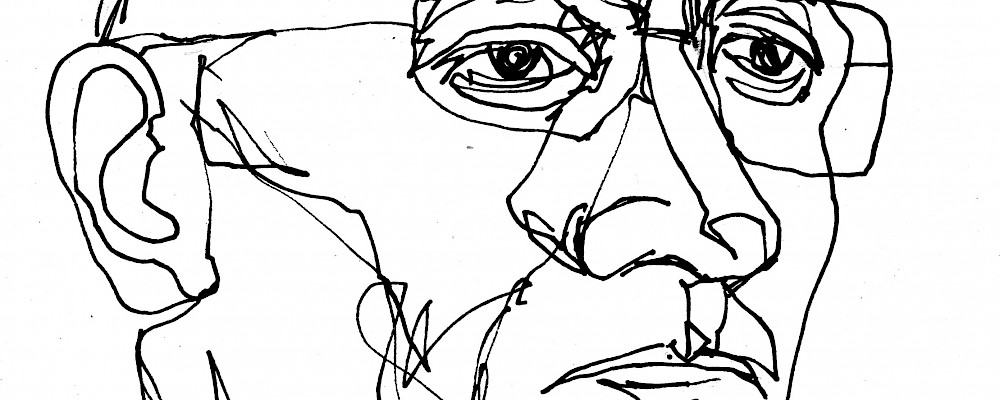The ambivalent European
The Slovenian philosopher Slavoj Žižek rarely finds words of praise. Instead, he is well known for his controversial pamphlets against capitalism or the power of the European Union. All the more, it might be astonishing for some to hear that now he even claims the EU to be essential.

Žižek is well known as one of the strongest critics of the European Union. He for instance accuses its leading powers of being a technocratic elite that authorizes itself to interfere into other countries’ political and economic issues – the Greek crisis is only one example to mention here – and there are to find a lot more serious accusations like these.
The global capitalism
His worst enemy – but best friend of the European Union – is the global capitalism. According to Žižek, it leads to creeping incapacitation of the citizenry, the rise of an increasing class society and the strengthening of right-wing populism. The EU was expecting global wealth and prosperity but in fact, there are only a few people profiting from capitalism. Furthermore, the Western World currently has to cope with huge economic and political problems. Besides his critics on global capitalism, Žižek also likes bashing against a typical figure of the West: the left-wing intellectual. He often appears in shape of a billionaire with social conscience and is of course also extremely fond of the EU. Žižek wants to diminish economic influence of the left-wing elite and to limit freedom of capital movement. He demands participation of society in political decisions and promotion of production processes.
An extraordinary acknowledgement to the EU
It is rather obvious that the EU with its technocratic strategies does not resemble Žižek’s political ideal. Nonetheless, he recently claimed in an article entitled Hinter dem samtenen Vorhang, published in the weekly journal Zeit, that the EU is the one and only possibility to secure the permanent preservation of the human race. Žižek assumes that our contemporary society suffers from a widespread inherited disorder called “Huntington’s disease”. In the Late Middle Ages, this disease was well known as mass hysteria. He compares this phenomenon to todays increasing populism that more and more results in ethnic-religious conflicts. Seemingly arbitrary acts of violence turn into a manifested ideology. It is the same diagnosis that the American political scientist Samuel Huntington already foresaw in his 1996 published book The Clash of Civilisations. There, he describes the outburst of a cultural conflict between the West and the Islamic World. According to Žižek, this is a consequence of the power of global capitalism and is only possible in our present age which he defines as post-political. It is characteristic for its depoliticization and limitation of public political debates. Instead of political discourses, there remains nothing else than the possibility of cultural conflicts that are only to solve with a peaceful coexistence of each culture. And this of course, is based on stable capitalism. As long as we have a flourishing global market, every lifestyle is tolerated, Žižek mocks. As long as economic integrity is secured, cruel customs or questionable traditions like homophobia or forced marriage are accepted without saying a single word of criticism. Thereby, Žižek accuses the West of false tolerance for its own profit. One might hear slight hints of (homophobic) racism in some of the philosopher’s textual examples, but that remains to be discussed in a different context. On the contrary, it is without doubt that he is not defending Eurocentric attitudes – another assertion he often sees himself confronted with.
The new universalism
In his article, Žižek describes an age hallmarked by restrictions of public discourse and prevention of an emancipated society primarily through the power of global capitalism. As a consequence remains a strong national populism and the Slovenian philosopher claims that only a new form of universalism is a way to stop this dangerous development. This form of universalism is also strengthened by Peter Sloterdijk in his book Was geschah im 20. Jahrhundert?. Sloterdijk recognises the need for a radical, political and economic change to secure mankind. Otherwise, he argues in concordance with Hegel, there will be a future of reckless state sovereignty. Each state will accept confrontations with other states for its own safety. He sees preventive measures in cultural civilisation, universal solidarity and state cooperation but in particular in suppression of expanding global capitalism and national solo acting. Žižek understands Sloterdijk’s claims as a new form of communism and the strengthening of the EU as the only possibility to put them into practise. Despite making use of capitalistic strategies and still being an institution he clearly despises, the EU nevertheless has the ability to provide social security – an indispensable component taking into consideration todays increasing populism. As much as it is justified to criticise and blame the EU, a future without it would be even worse. And even a left-wing cultural critic like Žižek has understood this now.
More articles by this author

Krisenhafte Demokratisierung: Philip Manows zweite politische Analyse erklärt die „(Ent-) demokratisierung der Demokratie“
Vor zwei Jahre erschien Philip Manows originelle Analyse des (nach wie vor aktuellen) Populismusphänomens. Mit seinem neuen Buch „(Ent-)demokratisierung der Demokratie“ ist ihm wiedermal eine differenzierte Deutung der politischen Gegenwart gelungen, die gewohnte Perspektiven verkehrt und sich von überkommenen Hypothesen abwendet.

Ein Strohmann geht um in Europa: Pauschalkritik an postkolonialem Denken als Tragödie und Farce
Niko Gäbs Polemik „Critical Highness“ weist darauf hin, dass es im postkolonialen Diskurs Leerstellen in Bezug auf Antisemitismus gibt. Dies zeigt nicht zuletzt die Debatte um den postkolonialen Theoretiker Achille Mbembe (Cheema/Mendel 2020). Auch Edward Said, Koryphäe der postkolonialen Theorie, steht im Verdacht „die Grundlagen eines sich postkolonial gerierenden Antisemitismus“ (Salzborn 2018, 124) zu formulieren. Nichtsdestotrotz liegen Gäbs Text einige Missverständnisse zugrunde, die wir im Rückgriff auf postkoloniale Theorien und neuere theoretische Entwicklungen erhellen wollen.

Globalization and Political Economy: The true Essence of Populism
„Every political economy is desperarate in its own special way“ (Manow 2018: 23). Transferred into the field of social science, the introductory sentence of Tolstoi’s Anna Karenina is one of the central ideas Philip Manow states in his 2018 published book "Die Politische Ökonomie des Populismus".
More articles in this category

Die Rolle eines Autors im Text. Von Italo Calvino zu Gilles Deleuze
Der Artikel wirft die Frage nach der Rolle des Autors für seine Texte auf. Gibt es ein Machtverhältnis zwischen einem Autor und seinem Text oder ist der Verfasser, wie bei Roland Barthes, „tot“. Wen kümmert es, wer spricht - dies ist hier die Frage.

Plädoyer für einen behutsamen Umgang mit Identitäten und Herkünften
In meinem Text setze ich mich für einen friedlich-freundschaftlich-solidarischen Umgang mit „Identität“ und „Herkunft“ ein. Letztlich plädiere ich diesbezüglich für zutiefst empathische Behutsamkeit. Bis das benannte Ziel der Behutsamkeit erreicht ist, schlängle ich mit jeweils unterschiedlichen Gefühlen durch ein facettenreiches Mosaik aus Literatur, Alltagskommunikation, Berufswelt, Sport, Musik und Mode, Film- und Fernsehen sowie durch ein Benjamin Blümchen-Hörspiel.

Die Zauberberge im 21. Jahrhundert
Was haben das World Economic Forum in Davos und das größte Yoga-Seminarhaus und Ashram in Bad Meinberg gemeinsam? Auf den ersten Blick: nicht viel. Doch auf den zweiten Blick erkennt man individuelle und gesellschaftliche Muster, die beiden zugrunde liegen.